By LISA EISENHAUER
While Americans remain divided on whether wearing protective masks helps contain the spread of the coronavirus that causes COVID-19, doctors and infection control experts at several Catholic health systems say they have no doubts.
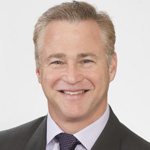
Gilberstadt
Dr. Huson Gilberstadt, chief clinical officer of the Ascension Florida and Gulf Coast markets where the deadly virus has surged in recent weeks, is among them. "If people were to get absolutely on-board with the masks and the social distancing, I think you would see a huge difference," Gilberstadt says. "You would see the rapid uptick on the curve start to plateau a little bit and then we'd have a slow trend down."
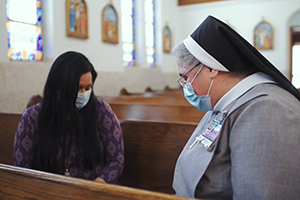
A screen shot from a CHRISTUS Health public service video that urges people to wear masks, social distance and wash their hands frequently.
To spread the word that masking is a key part of bringing the pandemic under control, Ascension and other systems are using old and new media for public information campaigns. Their tactics include joining with other health systems to issue press releases with pleas to the public to mask up and follow other safety measures, as the CHRISTUS Shreveport-Bossier Health System in Louisiana did Monday; co-sponsoring massive mask giveaways, as Dignity Health did in partnership with the San Francisco 49ers, the San Francisco Giants and a San Francisco radio station last week; and posting videotaped appeals from doctors and infographics about COVID-19 prevention measures on Twitter, Facebook and other social media, as many systems have been doing for weeks.
New information, new thinking
Cases of the coronavirus have leveled off in some states since spring, but cases are on the rise in many and soaring in a few, including Florida. That state has reported more than 10,000 new cases of COVID-19 several days this month. Caring for patients has pushed the intensive care units at Florida hospitals, including Ascension Sacred Heart in Pensacola and those that are part of Ascension St. Vincent's in Jacksonville, to near capacity.
Gilberstadt says he wasn't completely sold on the usefulness of masking among the public in the early weeks of the health emergency, but he is now. As doctors and scientists have learned more about the virus, such as that it can be spread by people with no symptoms, he says they've also learned more about how to contain it and found that masking is effective.
"That's why there was such an about-face from organizations like the World Health Organization and the U.S. Centers for Disease Control and Prevention," Gilberstadt says. "Now they include face masks in all their recommendations, because we just have learned so much more in such a short time. Obviously you have to pivot the way that you think when you get new information."
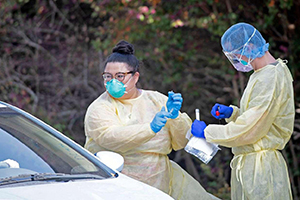
Ascension Sacred Heart associates in Pensacola, Florida, don masks and other protective wear as they test patients for COVID-19 at a drive-through site set up by the health system.
Ascension's push for universal masking has included social media posts as well as a press conference in May at which St. Vincent's President and Chief Executive Tom VanOsdol joined the mayor of Jacksonville and executives from other hospitals in the city to urge that everyone don face coverings while in public.
Filling in the unknowns
Bon Secours Mercy Health is among the systems whose leaders are encouraging workers to be models for masking in their communities. John Starcher Jr., president and chief executive, sent out a Fourth of July message reminding the system's almost 60,000 associates that they are ambassadors of Bon Secours Mercy Health inside and outside of its facilities and encouraging them to wear masks and social distance. The system also mailed masks to all those associates for use while off the job.
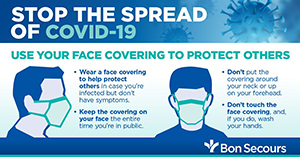
Many health systems are posting graphics like this one from Bon Secours Mercy Health System to social media to encourage universal masking.
Analytics on the virus show roller coaster-like rises and falls in cases in markets across Bon Secours Mercy Health's seven-state service area. Early on, hospitals in the system's Great Lakes region took the hardest hit. This month, the system's hospitals in South Carolina have been seeing the most patients with COVID-19.
Ellen Amalfitano, vice president for safety and reliability for Bon Secours Mercy Health, says everyone she knows in the medical community supports the use of masks in public spaces to help contain the pandemic. She's nevertheless aware that the push to encourage masking has met skepticism and resistance in the wider community. She blames that in part on faulty information being shared on social media.
"I think part of the challenge of this sustained pandemic is just that, it's a sustained pandemic of an illness that is completely unknown," Amalfitano says. "Because of the portability of information that we have with social media, it is very easy to fill in the spaces of what we don't know with things that we think are right."
Still a 'significant challenge'
Dr. Keith Starke, an internal medicine doctor who is chief quality officer for Mercy, says the virus has rolled in waves through that system, too. It first slammed the St. Louis region and now has Oklahoma in its grips.
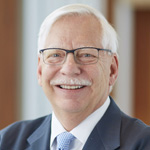
Starke
Even though some states, such as New York, report an infection rate as high as 20% among residents, Starke says most of the nation remains unexposed and therefore vulnerable. Safety measures such as masking and distancing could go a long way toward stemming its further spread, he says.
"When we look at it from a health perspective, the goal is to postpone what could be inevitable, that over a couple of years the entire population of the world becomes exposed," Starke says. "The more we can mitigate against that until the availability of a vaccine, the less mortality, the less complications from COVID, the less impact that it has on our society."
Barbara Pelletreau, senior vice president of patient safety for CommonSpirit Health, says universal masking is a big part of the clinical approach needed to bring the virus in check. And she says that approach will need to remain in place until the virus goes away or a there is a vaccine.
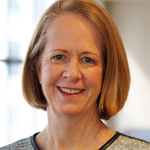
Pelletreau
"The coronavirus, the prevention of it, is a team sport. Having one or two people not wear masks isn't helpful," Pelletreau says. "It really takes a community to commit to wearing masks so that they can prevent the spread of the coronavirus."
Targeting the young
Dr. Steven Gremillion, chief medical officer with Franciscan Missionaries of Our Lady Health System, said the number of patients being treated with COVID at the system's Our Lady of the Lake Regional Medical Center in Baton Rouge, Louisiana, spiked to more than 200 in mid-April. After a state lockdown was ordered, the number dropped to around 20 in early June. Now cases are on the rise again, hitting 93 on Monday, an increase Gremillion believes is connected to people ignoring precautions such as masking and social distancing during Fourth of July gatherings.
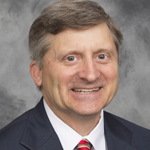
Gremillion
As are hospitals in the rest of the country, Gremillion said Franciscan Missionaries hospitals are seeing many younger patients with the infection. One of the people he was helping care for in ICU last week was in his 30s.
"This is a young healthy male who had no previous underlying illnesses," Gremillion says. "Why he got this sick I can't tell you. What is it about the genetics or predisposition of certain young people to get really sick, I don't know."
Gremillion wishes he could convince the younger generation that not only are they risking their own health if they don't mitigate their exposure to the virus, but that they put anyone they come in contact with at risk if they contract it.
"We need to put out the message (to use precautions) to everybody but we probably do need to target millennials somewhat because I think where we got into our problem with this second surge of cases would be with the younger people not following the guidelines," he says.
To reach that generation, Franciscan Missionaries has taken its public education campaign about the importance of COVID precautions to new media sites such as Instagram and Twitter and put ads on music sites such as Pandora.
Values-based appeal
Despite the new uptick in COVID cases that his system is seeing, Gremillion believes the trend could come to a relatively quick end if the nation's health experts and political leaders could persuade more of the public to join the effort. "I'm convinced that if we do all the right things, such as wearing masks and social distancing and washing our hands, I really think we can keep our economy open and I think we can do some type of schooling, I think we can continue to do surgical procedures," he says.
In addition to helping get the nation's economy back on track and return society to some semblance of normal, doctors and infection control experts say masking has a clear connection to Catholic health systems' missions of securing the common good and protecting the human dignity of all. Wearing a mask, they point out, protects not so much the person wearing it, but more so those who are nearby from germs that the person behind the mask might spread.
As Starke of Mercy notes: "When we have the values particularly around dignity of others and seeing Christ in others and loving our neighbors as ourselves, those are all things that masking is an inherent part of because it is about taking care of each other."
Video: ‘Don’t give up’ on COVID precautions, CHRISTUS Health urges
Love Thy Neighbor: CHA takes kind approach to masking campaign
CHA has boiled down its campaign to encourage the public to embrace masking to three words: Love Thy Neighbor.
The association is using those words to spread the message that masks can help stem the virus that causes COVID-19 and has claimed more than 600,000 lives worldwide and more than 140,000 in the United States to date.
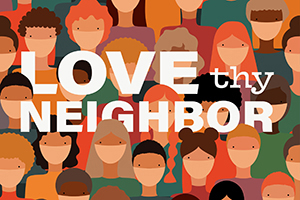 A graphic image with "Love Thy Neighbor" and faces of all colors sporting masks is being shared by the association on social media sites including Twitter, Facebook and Instagram.
A graphic image with "Love Thy Neighbor" and faces of all colors sporting masks is being shared by the association on social media sites including Twitter, Facebook and Instagram.
Sr. Mary Haddad, RSM, president and chief executive officer of CHA, says: "Wearing a mask is about caring for your friends and neighbors and follows Christ's simple commandment to love one another. It's an easy, safe and effective way to protect everyone for the common good."
Sr. Mary also points out that wearing a mask in public spaces has been recommended by the Centers for Disease Control and Prevention.
CHA is encouraging Catholic health systems as well as the association's partners in faith, education and social services across the nation to join its campaign using the hashtag #lovethyneighbor on social media. Many of those systems and partners have added messages from the campaign to their own efforts to encourage the public to wear masks.
"With so much misinformation about COVID-19 circulating on social media, we felt it was important to provide a simple way to convey that wearing a mask is less about protecting yourself as it is about protecting others," says Brian Reardon, vice president of communications and marketing for CHA. "Our hope is that the more we can spread this message about the Golden Rule, the more we can slow the spread of the coronavirus."
Reardon says anyone can access assets for the campaign at chausa.org/masks. The site allows users to download images and animated GIF and MP4 files in English and Spanish to share on social media. The animations present a series of myths and facts designed to clarify some of the misinformation about wearing masks. The webpage also provides links to useful information, resources and articles about the importance of wearing masks in public during the pandemic.
—LISA EISENHAUER
Copyright © 2020 by the Catholic Health Association
of the United States
For reprint permission, contact Betty Crosby or call (314) 253-3490.